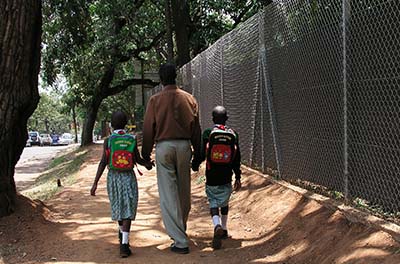Development in Uganda, especially in the energy and mineral sectors, increasingly involves land acquisition and involuntary resettlement, which can lead to loss of assets and livelihoods. The Ugandan Government had developed and approved a new land policy, but inadequate guidance on processes and procedures of resettlement led to inconsistent practices and standards across the country. The Government, with support of the World Bank, sought to collaborate with the Ugandan Martyrs University (UMU) and other Ugandan universities to develop and offer courses on Management of Land Acquisition, Resettlement, and Rehabilitation (MLARR). On the Bank’s recommendation, Ugandan officials visited Bangladesh to learn how to develop and implement MLARR curricula from BRAC University, which is a key center of excellence in involuntary resettlement in East Asia.
Two Ugandan officials and three UMU educators visited BRAC University in September 2011 to discuss the results of a market survey for MLARR courses, and to receive guidance on drafting a curriculum suitable to Uganda and other East African countries. After this visit, the UMU established a longer-term partnership with BRAC University, which included BRAC experts’ visiting Kampala to offer guidance and trainings in MLARR, and partnering with Ugandan Christian University and Makerere University to guide them in developing MLARR courses. Ugandan universities launched a Community of Practice on MLARR, attracting over 200 members.
More than 300 officials from public and private sector institutions, non-governmental organizations (NGOs), and other groups from Uganda and East African countries have completed MLARR courses. Participants have praised the courses for their practical value. John Sebuyira, from Uganda’s Ministry of Lands, said that his course was “an eye opener as far as implementing land acquisition projects . . . . Many times I read papers on how land acquisition has been mishandled . . . after the training we have been asked to come up with land acquisition guidelines . . . and I know what to do.”
The dialogue fostered by the exchange also contributed to the consortium of Ugandan universities becoming a center of excellence in involuntary resettlement for East Africa, and newfound knowledge has been applied to development projects. For example, Ugandan officials involved in transport and oil projects used their knowledge to improve social impact assessments, resettlement action plans, stakeholder consultations, and livelihood restoration programs. NGOs and project-affected peoples are more active in monitoring resettlement and demanding rights, such as the right to timely and adequate compensation.


 China
China Colombia
Colombia Denmark
Denmark India
India Indonesia
Indonesia Mexico
Mexico Russian Federation
Russian Federation Spain
Spain United Kingdom
United Kingdom